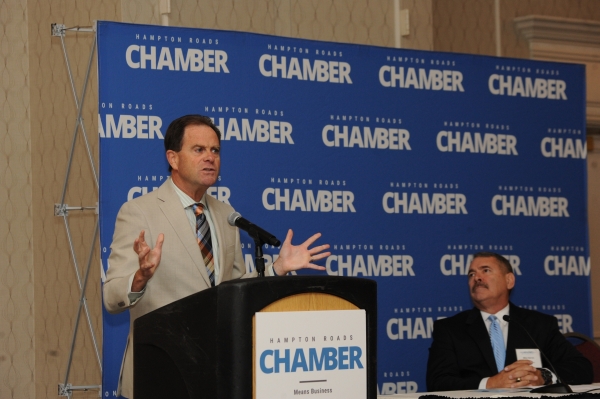Coastal Resiliency: From Threat to Economic Engine
 President John R. Broderick addresses forum participants as Inside Business publisher Mike Herron looks on.
President John R. Broderick addresses forum participants as Inside Business publisher Mike Herron looks on.
By Jon Cawley
Hampton Roads residents know that sea level rise and recurrent flooding pose serious threats, but the region's business leaders also view the issue as an economic opportunity.
Second only to New Orleans in terms of risk from storm and tidal water encroachment, the region -- and Norfolk in particular -- sits at ground zero when it comes to how communities will address the issue in the near and long term.
Most researchers agree that the problem will get only worse. Local relative sea level rise is occurring at a rate of about 1.7 inches per decade, based on 100 years of measurements at the Sewells Point buoy. That's twice the global average, and the highest rate on the Atlantic coast.
So where is the economic benefit?
Larry "Chip" Filer, an associate of Old Dominion University's Economic Forecasting Project and associate professor of economics, says many Hampton Roads companies are already working on addressing the issue of coastal resiliency.
"We could end up with the potential for water technology to be a cluster in Hampton Roads and an actual economic engine," he said. "That's unique because it's the one (economic cluster) that cuts across all clusters of activity."
Filer made the statement to about 150 business, government and community leaders who attended the Inside Business Hampton Roads Resilience Forum held Aug. 22 at the Norfolk Waterside Marriott. Inside Business, which is owned by The Virginian-Pilot, billed the inaugural forum as "a regional summit to advance resilience strategies and create economic opportunity."
Filer told the crowd that success will depend on the development of resilience adaptations.
"We are well positioned to take a leadership role, not only in this country, but the world," he said. "Collaboration will take it to the next level by bringing together a lot of different disciplines to attack one problem."
State Del. Chris Stolle, who gave the forum's closing keynote address, echoed Filer's endorsement of collaboration and emphasized the need to involve citizens in the process.
"We are singularly responsible for addressing coastal flooding," he said. "How do we turn it into an incubator for ideas and technology moving forward? There are a lot of daunting challenges, but also incredible opportunities."
Old Dominion was a presenting sponsor of the resiliency forum. In that role, several University researchers involved with the interdisciplinary sea level rise initiative, which was launched by President John R. Broderick in 2010, contributed their expertise during break-out sessions that included discussions of:
- infrastructure and public services;
- how localities adapt;
- building adaptation strategies, such as retrofitting and new design;
- science and resilience technology; and
- growing a water management economy.
President Broderick noted how far the University has advanced on issues of resiliency and coastal flooding since the initiative was launched. At the time, he recalled, "people said it was a good exercise for engineers and scientists." But now, Old Dominion is fully engaged across disciplines to address what has become "a bottom line issue for all of us in Hampton Roads.
"We need to make sure we are coming from a variety of bases," he continued. "That strengthens the types of things we can do."
In the event's main keynote address, Brian Moran, Virginia's secretary of public safety and homeland security, as well as chief resilience officer, said he was encouraged by the number of business leaders who attended the event.
"There are folks here from ODU and other organizations that do a lot of work on this issue," he said, noting that water levels are expected to rise 1.5 feet by 2050. "That's just around the corner. We must recognize that as a Commonwealth and community, 40 percent of small businesses do not reopen following a disaster. Of them, only 29 percent are still in operation two years later. It's devastating to small business."
Moran reiterated the need for partnerships between academic institutions and the business community.
"We can create jobs with a resilient community," he said.

